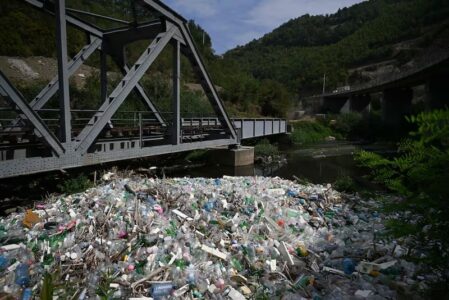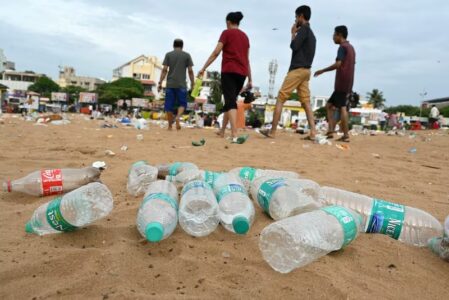One million bottles of water are bought every minute around the globe, researchers say, raising concerns about the impact of microplastics on the health of humans and the planet.
Around two billion people with limited or no access to safe drinking water rely on bottled water. However, many others consider it to be convenient and even potentially safer and healthier than tap water.
That is a misguided belief, according to experts from Weill Cornell Medicine in Qatar, who say it is not subject to the same strict quality and safety standards as tap water, and can carry the risk of harmful chemicals leaching from the plastic bottles, especially if they are stored for a long time, and exposed to sunlight or high temperatures.
Somewhere between 10 per cent and 78 per cent of bottled water samples contain contaminants such as microplastics, often classified as hormone disrupters, and various other substances including phthalates, used to make plastics more durable, and bisphenol A, which is also known as BPA.
Writing in a commentary for BMJ Global Health, the authors say microplastic contamination is associated with oxidative stress – an imbalance of free radicals and antioxidants in the body that can lead to cell damage, immune system dysregulation, and changes in blood fat levels. BPA exposure has been linked to later-life health issues, such as high blood pressure, cardiovascular disease, diabetes and obesity.

“While there are short-term safety thresholds, the long-term effects of these contaminants remain largely unknown,” they write, adding that microplastics can also enter the food chain. Microplastics are defined as less than 5mm in length, and have been found everywhere, including in human veins and breast milk.
Tap water is also more environmentally friendly, as plastic bottles are the second most common ocean pollutant, representing 12 per cent of all plastic waste. Globally, only 9 per cent of plastic water bottles are recycled, with most ending up in landfill or incinerators, or exported to low and middle-income countries.
The process of extracting the raw materials and manufacturing plastic bottles also significantly contributes to greenhouse gas emissions. And while some efforts have been made to encourage the use of drinking water in restaurants and public spaces, and to curb the prevalence of single-use plastics, much more needs to be done, write the authors.

“Collectively, the accumulated evidence underscores the critical role of government interventions and educational campaigns in shifting public perception and behaviour. These campaigns should highlight the environmental stewardship and health benefits of choosing tap water, effectively driving a cultural change towards more sustainable consumption practices,” the authors write.
The reliance on bottled water incurs significant health, financial and environmental costs, they say. Governments must urgently confront the problem, including in low and middle-income countries where there is a pressing need for them to invest in safe drinking water infrastructure.
“By prioritising tap water consumption, we can collectively address the multifaceted challenges posed by [bottled water] and embrace tap water as a cornerstone of environmental responsibility and public health,” they write.
A 2018 study by researchers in Brazil, Portugal and the US, who looked at bottled water from nine countries, found that 93 per cent of samples contained microplastics, mostly plastic fragments, with fibres the next most prevalent category.
Two years later the publisher Consumer Reports tested 47 bottled waters and found perfluoroalkyl and polyfluoroalkyl substances (PFASs), known as “forever chemicals” because they linger in the environment, in “many products”. These chemicals, the source of which was unclear, have been associated with developmental changes, cancer and harm to the immune system, among other effects.
In 2019, in its first report on the issue, the World Health Organisation said microplastics in tap and bottled water do not appear to pose a health risk to humans, because larger particles, and most smaller ones, pass through the body without being absorbed.
However, they also warned that current evidence was fairly limited and much more investigation was needed to determine health threats to humans.



